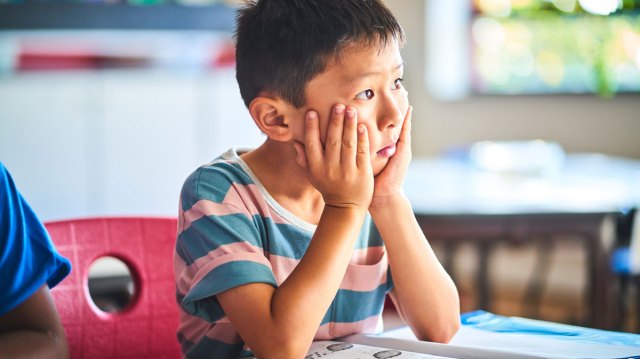There’s an adage that says, “The most valuable life lessons can’t be taught—they have to be experienced.” And so it often goes with kids and many critical life lessons. For lots of developing young minds, learning things the hard way—whether through experience and/or repetition—can help to ensure that lessons learned are genuinely instilled. We asked parenting experts to share the best hard-earned life lessons for kids ages preschool to high school; here’s what they had to say.
1. Everyone makes mistakes.
Nobody is perfect, and making mistakes is an essential life lesson that children can learn starting from a very young age. “It’s important that we make mistakes because that’s how we learn,” said Boston Baby Nurse & Nanny founder Carole Kramer, a registered nurse and best-selling author of Newborn 101. Kramer explained that kids may accidentally spill things or break something, for example, but teaching them that the accident itself isn’t a bad thing, it’s what you do and how you react afterward—that’s the life lesson. “Kids shouldn’t get down or be upset at themselves when they make mistakes,” Kramer said. “Parents can use [mistakes] as teaching opportunities.”
2. Life isn’t always fair.
Every parent has heard their kiddo whine, “But that’s not fair!” Whether it’s a conflict with siblings or friends, or it’s used as a stalling tactic to avoid bedtime, kids will argue a lack of “fairness” to get their way. But many things and experiences in life aren’t always fair. “I think that’s a hard lesson for kids to learn,” said Kramer. “The truth is, you can’t always get what you want all of the time.” For younger children, fairness may seem like an abstract concept, but as they grow older, kids may recognize that they could do the right thing and still get the wrong outcome—sometimes through no fault of their own.
3. Actions have consequences.
One of the first steps toward understanding accountability and taking responsibility is learning that every action has a consequence. Kids may experience consequences of their actions that are positive, such as hard work reaping benefits and rewards, or negative, such as inappropriate behavior leading to punishment. But connecting the dots between what you do and what happens is an important lesson to learn for children of all ages, our experts said.
4. Attendance is important.
Showing up and being on time is part of overall success, and sometimes kids need a brush with repercussions to understand how important it is. “The importance of showing up and being on time (for school, for example) is something kids need to learn, oftentimes, the hard way, though hopefully sooner than later,” said Marjie Hadad, a global PR and parenting expert and author of The Power of PR Parenting: How to raise confident, resilient, and successful children using public relations strategies.
“In public relations, we schedule interviews for our clients. It’s very important that our clients arrive on time at the specified location for an interview. If without a good reason and they do not respect their commitment, they risk losing the opportunity.” That being said, perfect attendance isn’t necessarily the goal because there will be times when kids will have to miss an event or a day of school. It’s what they do when they are present that matters.

5. Pay attention to the instructions.
In pursuit of striking independence, kids may take instructions as loose guidelines rather than rules to be followed. But paying attention to instructions is an important lesson to ensure that something is completed properly or an intended goal is achieved. “There are times when creativity is required to navigate unexpected challenging situations,” said Hadad. “However, most times, it would be best to listen and abide by instructions.”
6. You won’t always get picked first.
It can be easy for kids to feel hurt or slighted if they are not picked first or are not invited to a friend’s birthday party. But these are opportunities for parents to teach their kids that sometimes there are reasons why things happen that people don’t know about. “Allow your child to have hurt feelings,” said Boston Baby Nurse & Nanny’s Kramer, but also teach them that sometimes things may happen for reasons that are outside of their own control.
7. It’s OK to be uncomfortable.
Kids may be anxious in situations that are new or unknown to them, but managing to get through those kinds of experiences can help to build self-confidence and resilience. “Most of us learn this lesson as adults,” said Kramer. “We often have this mindset that everything always has to be great and everything needs to be cool. But we’re going to have a variety of emotions, and not all of them will be good ones.” Learning to be uncomfortable is a valuable lesson for kids to learn early.

8. It’s OK to be bored.
The corollary to being OK with being uncomfortable is being OK with being bored. As parents, we often feel we need to entertain or occupy every second of our children’s lives, so when there is downtime, our kids may express their boredom. Rather than trying to immediately distract or placate a bored kid, teach them that feeling bored from time to time is not only OK, but it’s a natural and ordinary part of life.
9. Don’t take everything personally.
What others do and say is often simply a projection of their own reality, so an important life lesson for kids is not to take everything so personally. “Someone may be having a rough day, and they take it out on others,” said Kramer. For a six-year-old, that may be difficult to understand, but as kids grow older, they can recognize that other people may be experiencing life differently, and parents can teach their children to be empathetic toward others.
10. Be thoughtful about the power of words and tone.
Parents can help kids develop better communication skills by being thoughtful about the words they choose and the tone used to deliver them. “Everyday communication should be given some respect, said author Hadad. “Sometimes this is a lesson that needs to be learned the hard way by our kids in social, academic, and after-school job scenarios. When word choice and tone are chosen carelessly, there is the risk of losing a friend, alienating a teacher, or annoying an employer. If these were the goals, then mission accomplished. If these weren’t, well then, hopefully, a lesson well learned. Think before you talk and choose your delivery wisely.”











